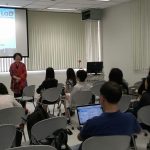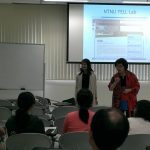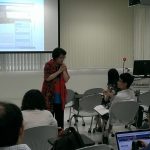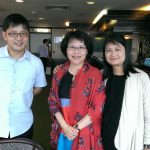Abstract
Based on sociocultural theory of second language acquisition (SLA), a meaningful language must be learned in conjunction with society, culture and personally relevant life experiences. However, most schools are not funded to build an English Village, and most students do not have the opportunity to study abroad. Fortunately, thanks to the rapid advances in and popularity of wireless communication and multimedia environments, language learning in a virtual reality (VR) environment have received considerable attention in the past few years. This talk will first emphasize the importance of context for L2 learning. We believe that successful second language acquisition involves the information processing theory, the sociocultural theory, and embodies cognition. Next, a series of studies from my research team working with different universities in Australia and the U.S.A. and elementary schools in Taiwan will be reviewed. The research aim is to create a virtual environment for student-centered, task-based, and self-directed learning. I will start with the construction of our 3D virtual worlds, including the NTNU campus, a zoo, a kitchen, a restaurant, etc. and move on to their applications, especially in Mandarin learning and English learning. Following these topics will be a description of another experiment, Build & Show, a platform which involved participants’ active participation in constructing buildings of their own. Overall, in this talk, two main questions will be discussed: 1) How do we construct a 3D multi-user virtual environment for language learning through acceptable and effective context? and 2) Is the virtual context able to enhance students’ language performance? Suggestions for future research will also be provided. Through this talk, I will raise many other relevant issues, such as learning in different contexts, studying abroad, language education for immigrants, human brain, etc.
Speaker
Professor Karey Yu-Ju Lan
Distinguished Professor, Department of Applied Chinese Language and Culture, National Taiwan Normal University
About the Speaker
Professor Karey Yu-Ju LAN is currently a Distinguished Professor in the Department of Applied Chinese Language and Culture at National Taiwan Normal University. Before becoming a professor at the university, she had been teaching in two different elementary schools in Taiwan for more than 20 years. She enjoys working with children and loves to help them grow and learn. This passion has motivated her to build a wide variety of learning environments to meet Chinese as foreign language and English as foreign language learners’ multiple needs. She served as Chair of the Special Interest Group: Technology Enhanced Language Learning in the Asia–Pacific Society for Computers in Education from 2012 to 2013. Her research interests include language learning in virtual worlds, mobile learning, and online synchronous teacher training. She has been working with a group of researchers to develop and implement the curriculum, pedagogy, lessons, teaching materials, etc., based on the online 3D virtual contexts and mobile learning environments for foreign students learning a language or culture.
Date
24 May 2016 (Tuesday), 2:30 - 4:00pm
Location
Room 205, 2nd Floor, Runme Shaw Building , HKU
Chair
Professor Angel Lin
Presentation Slide
Presentation Slide 1 :
- ‘Curses in TESOL’: Postcolonial Desires for Colonial English
- “Enhancing Data-Driven Learning in Disciplinary L2 English Contexts: Introducing CorpusMate”
- “Neither Bilingual nor Education”: critiques of bilingual education in state school education and responses to them
- A Two-Tiered Investigation Into the Dual Goal in EMI Education: Assessment and Instructional Practices
- Acculturation and digital trans-literacies in identity construction: An interdisciplinary perspective (Nov 6th, 2025)
- Appropriation of Resources by Bilingual Students for Self-regulated Learning of Science
- Auckland U – HKU Joint Webinar (28 November, 2024)
- Automated Content Feedback and Young English Learners’ Behaviours, Performances and Response
- Book Launch Seminar: Language Across the Curriculum & CLIL in English as an Additional Language (EAL) Contexts
- Critically Engaged Literacy Workshop as Decolonial and Anti-Racist Pedagogy (April 16th, 2025)
- Crosslinguistic influence in foreign and second language learners
- Developing Language Educators’ Understanding of Assessment Reform Discourse and Practices: School-University Collaborative Action Research as Praxis
- Digital literacy pedagogy:
Key issues in the age of Gen-AI
- Digital Multimodal Composing for Specific Purposes: The Case of Sustainability Discourse
- EMI Symposium 2023: Fostering Collaboration
- Exploring Self-Regulated Use of Artificial Intelligence Tools in Language Learning
- Generative AI: Implications and Applications for Education
- Global Englishes-informed Teacher Education: Present Cases and Future Directions
- HKU-NCL Joint Webinar (Nov 27th, 2025)
- HKU-Newcastle U Joint Webinar: Critical Perspectives on Language Policy and Practice (May 2nd, 2025)
- HKU-NIE Joint Webinar: Designing Learning and Assessment with Multimodality in CLIL Classrooms
- Hong Kong SAR Government’s ‘Biliteracy and Trilingualism’ Policy: Sizing Up and Meeting the Challenge
- Hong Kong Students’ Self-regulated English Writing for Academic Studies
- HUMANISING TECHNOLOGY in Language Learning & Teaching
- Interactional Reflexivity in the Age of AI: Rethinking L2 Writing Teachers’ Assessment Literacy Development (Oct 9th, 2025)
- Language ideologies in text-based art of Xu Bing: Implications for language policy and planning
- Learning about and using academic vocabulary: Critical issues for pedagogy (Feb 18, 2025)
- Motivational and Empowering Feedback in the Writing Classroom
- Multilingualism and its Ramifications
- Multilingualism and Mobility: The Semiotic Production of Centres and Peripheries in Airport Spaces
- Multilingualism and the Brain
- Narrative Skills in Mandarin- English Dual Language Immersion Learners
- Narratives of Cross-Cultural Understanding among South Asian Diasporic Students in Hong Kong
- NCL-HKU Joint Webinar (June 5th, 2025)
- Newcastle U-HKU Joint Webinar on Cultural Artifact Creation (14 November, 2024)
- Oklahoma U-HKU Joint Webinar (05 December, 2024)
- Optimising Classroom Learning: Speaking in and about Mathematics Classrooms
- People who come from state education are different”: How language use maintains social exclusion in Medical Education
- Policy vs Practice: Homework in Hong Kong EFL Classrooms
- Review of recent research on AI-powered technology in second language teaching, learning and testing (Feb 10, 2025)
- Revival and Threat: Language ideologies, policy, and nationalism in Kazakhstan and Mongolia
- Secondary school students’ source use in inquiry project-based learning (PjBL): Working towards avoiding plagiarism and engaging with sources
- Sociocultural awareness of international ELT policies: The case of a US-funded program in Morocco
- Studies of Public Policy Process and Implications for Research on Education Policy
- The Challenges of Teaching Non-Chinese Speaking Children to Learn Chinese at Kindergarten Level
- The Contributions of Growth Rates in Phonological and Spatial Abilities to Chinese Reading and Mathematical Competencies: A Longitudinal Study of Hong Kong Kindergarteners
- The Digital Literacies Forum 2023
- The Effects of the Medium of Instruction in Physics on Achievement and Motivation to Learn
- The Historical and Linguistic Background of South and Southeast Asian Multi-ethnic Communities in Hong Kong
- The Influence of Extramural Access to Host Culture Social Media on Ethnic Minority Students’ Motivation for Language Learning
- Top desk rejection reasons and how to avoid it
- Translanguaging in Everyday Textual Performances: Implications for Literacy and Pedagogy
- Understanding Language Learning Motivation in Hong Kong
- University of Melbourne – University of Hong Kong Joint Symposium (19 November, 2024)
- Using Reading to Learn Pedagogy to Support Non-Chinese Speaking Students Learning Chinese in Hong Kong
- Videos in language classrooms: A social semiotic perspective
- What can we learn from the Hong Kong Archive of Language Learning Project?
- New technologies in literacy research:
“Measuring” embodiment through
galvanic skin response
- Publishing in top-tier applied
linguistic journals:
Perspectives of an editor�reviewer-author






